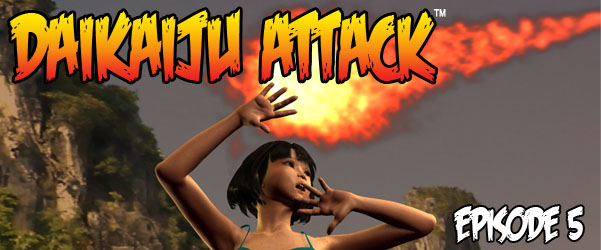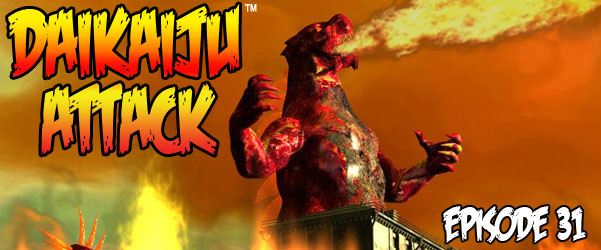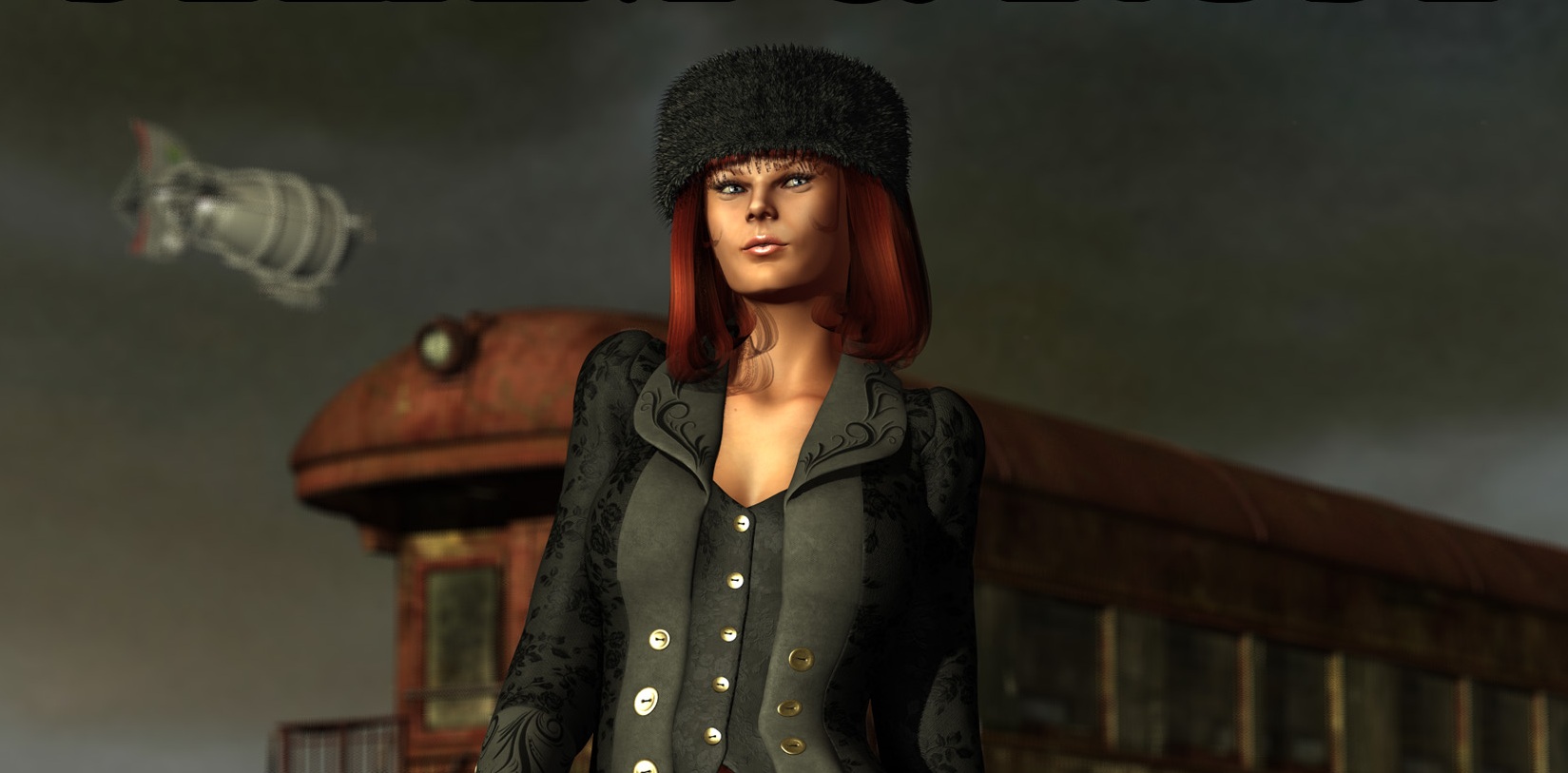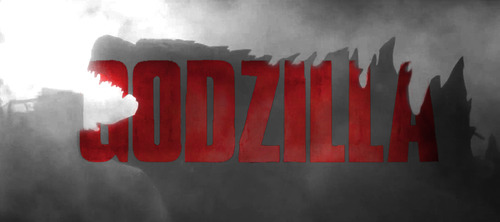
This is the fifth part of a serialized giant monster story published in weekly installments on this site.
Tune in every week! Click here to read the first part.
Click here to join the Daikaiju Attack Facebook group.
5. Doctor Shimura’s Flight
~ July, 1966 – 4 AM, Local Time ~
Doctor Akira Shimura leaned back in his seat aboard the Japan Airlines DC-8 and tried to relax. He was grateful to have been upgraded to a first-class seat—being famous did have its perks sometimes—but delays at the airport had made this an arduous red-eye flight, and he still couldn’t fall asleep.
Why was he having such trouble closing his eyes? The week-long World Science Authority conference in Hong Kong had left him exhausted, more than ready to return to Okayama, though he wasn’t looking forward to the two-and-a-half hour drive home from the international airport in Osaka. Still, his assistant would be at the airport to meet him—assuming they hadn’t locked her up for causing trouble at that military installation. He shook his head and chuckled softly. Emiko was a bright girl, but she hadn’t figured out that Shimura knew what she’d been doing with her time off.
One advantage to being old, he thought. Young people always underestimate you.
This happened surprisingly often with students, despite the fact that so many people insisted on referring to him as “Japan’s Einstein”—a moniker that Shimura despised. He wondered if Einstein had had trouble sleeping on plane flights.
Shimura’s insomnia was more than his usual uneasiness during air travel, but he couldn’t pinpoint what was keeping him awake.
Was he still high on adrenalin from this evening’s meteor shower? It had been among the loveliest he’d ever seen. “The Hydra Meteor Swarm,” one of his colleagues at the conference, Professor Barry from Caltech, had immediately dubbed it, since the falling stars appeared to originate in the constellation Hydra.
“Maybe it will return every year, like the Perseid Swarm does in August,” Barry had speculated. “Funny, though, that we’ve had no reports of a new comet to go with it.”
“Perhaps it was caused by an unknown asteroid splitting apart,” Shimura had suggested.
That point had generated quite a bit of conversation among the conference delegates, even as they watched the celestial show before heading to the Hong Kong airport to return to their respective homes.
Concern about the meteors had delayed Shimura’s flight. Reports were that some had struck land in China, and perhaps Japan and Korea as well, and no one could say how many fireballs might have crashed into the sea.
Shimura wondered about that now, as he stared out of the DC-8’s window at the Sea of Japan, so far below. Darkness shrouded the plane’s cabin, and all the rest of the passengers lay asleep. Only he seemed to be suffering from insomnia.
The plane’s window was small, as airplane windows always were. Shimura had to press his face very near to the glass to get a decent view. Even then, his vision was limited to a ninety-degree arc, with the rear portion severely blocked by the wing. Still, peering out was far better than staring at the luggage compartment overhead, and because the plane was flying very low, due to upper-air turbulence (or perhaps fear of meteors), his view proved exceptional.
The ocean looked like a wide swath of gray-black fabric, rippling in the wind. Moonlight caught the crests of the waves, making them shine silver—like tiny fish darting to the surface of a pool.
Shimura smiled, noticing, far ahead and just within the arc of his vision, the lights of a fishing fleet—squid boats, probably—bobbing on the ocean. A quick glance through his collapsible field glasses, which he always kept in his breast pocket, confirmed Shimura’s analysis. Looking through the window with the binoculars was tricky, but well worth the effort.
To think that seven centuries before, those boats might have been Mongol ships, looking to invade Japan. Only providential typhoons—the Kamikaze—had kept Shimura’s home country from being overrun then. The Divine Wind had turned back Kublai Khan’s fleets twice, sending many of the Chinese invaders to the bottom of the sea.
A terrible fate, Shimura thought, contemplating the thousands of ships and countless corpses rotting in the deep below. Ghastly, though a huge blessing to his home and people.
He could see the fleet more clearly now, a school of diesel-powered fish working together in deft patterns to trap and harvest their prey, the squid attracted by the ships’ bright lights. From Shimura’s vantage point in the heavens, the mighty vessels looked like toy boats in a bathtub, though the DC-8’s powerful engines were carrying him closer every moment.
But wait… What was this?
Shimura rubbed his tired eyes, to make sure he wasn’t seeing things.
No. There could be no mistaking it: a huge water funnel—like the spout of an enormous whale—had fountained up ahead of the ships.
Extraordinary!
What could cause such a thing? No clouds obscured the night sky, nor did Shimura see any sign of a storm that might create such a phenomenon.
Almost as soon as he focused his tiny field glasses upon it, the huge gout of spray died away. Sadness welled up inside of him. Science had explained so much of the world now. To glimpse anything new was a real treat. If only the waterspout had persisted longer! If only he could have studied it!
Hold on…
Now a black shadow moved across the ocean’s surface, heaving up the moonlit water in great silver ripples as it passed. Shimura could think of no explanation except that the shape was a huge wave—and it was heading directly toward the tiny fleet. Would such an anomaly present a danger to the vessels?
Even with all his scientific expertise, he couldn’t be sure. The fishing boats might simply bob along with the surge, assuming it wasn’t too tall.
But the wave’s size was impossible to tell through his binoculars, despite the fact that the plane had drawn even with the fleet and Shimura had a direct view of the drama unfolding a scant few miles away.
Did the fishermen even see the wave coming?
He hoped they did. He hoped they would take whatever precautions were necessary.
Then the surge reached the boats, and all hell broke loose. The ocean splashed up with great gouts of spray, and the ships twisted and rocked, some nearly heaving over onto their sides. It was as though a typhoon had fallen among them, a typhoon from a cloudless sky.
Shimura gasped, and his heart pounded, as first one and then another of the boats sank, smashed by towering waves that sprang up out of nowhere. He sat transfixed as masts snapped and lights blinked out, one by one. He could not see the men bobbing in the waves so far below, but he knew they must be there, though many had surely gone down with their ships.
They’ll all be killed! he realized.
Only two ships remained afloat, and the airplane had nearly passed the calamity, when Shimura sprang from his seat and ran toward the cockpit to alert the pilot.
Perhaps if the plane sent out an SOS, some of the ships’ crews might still be saved.
As the scientist dashed forward, the last thing he’d seen before his view had been blocked by the DC-8’s wing burned like fire in his mind:
A great, silvery coil surging out of the waves, wrapping around one of the boats, and dragging it under.
Surely, he must have imagined it, or the moonlight had played tricks with the heaving waters—because nothing that large could actually be alive.
Thanks to Steve, Vicki, Doris, Edward, Christine, David, and Kiff for beta-reading!
All contents, copyright 2013 Stephen D. Sullivan. All Rights Reserved.




